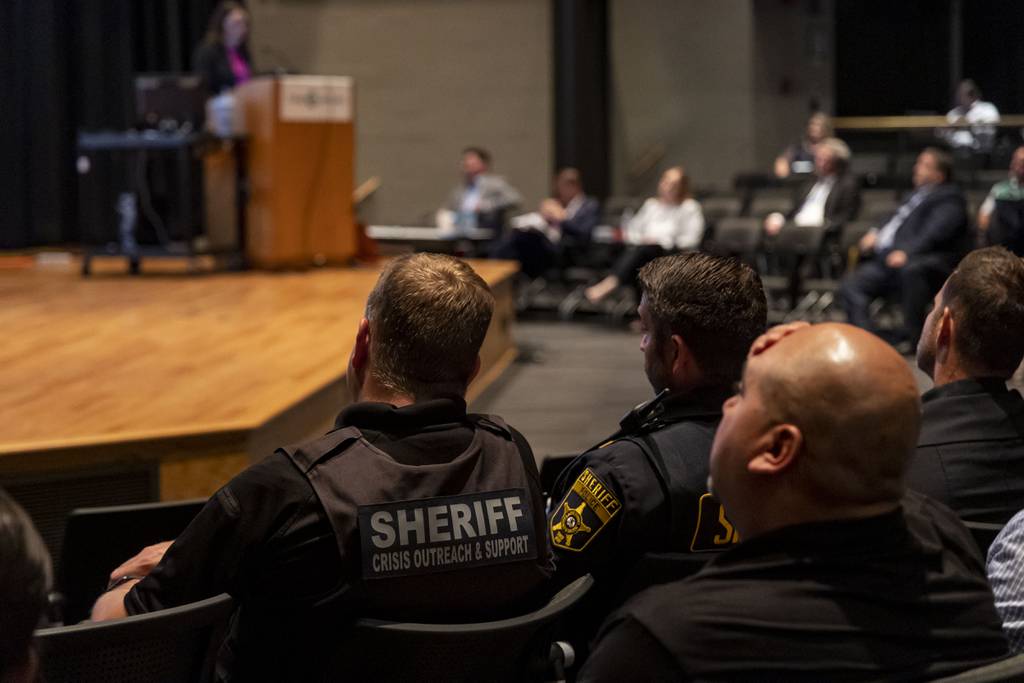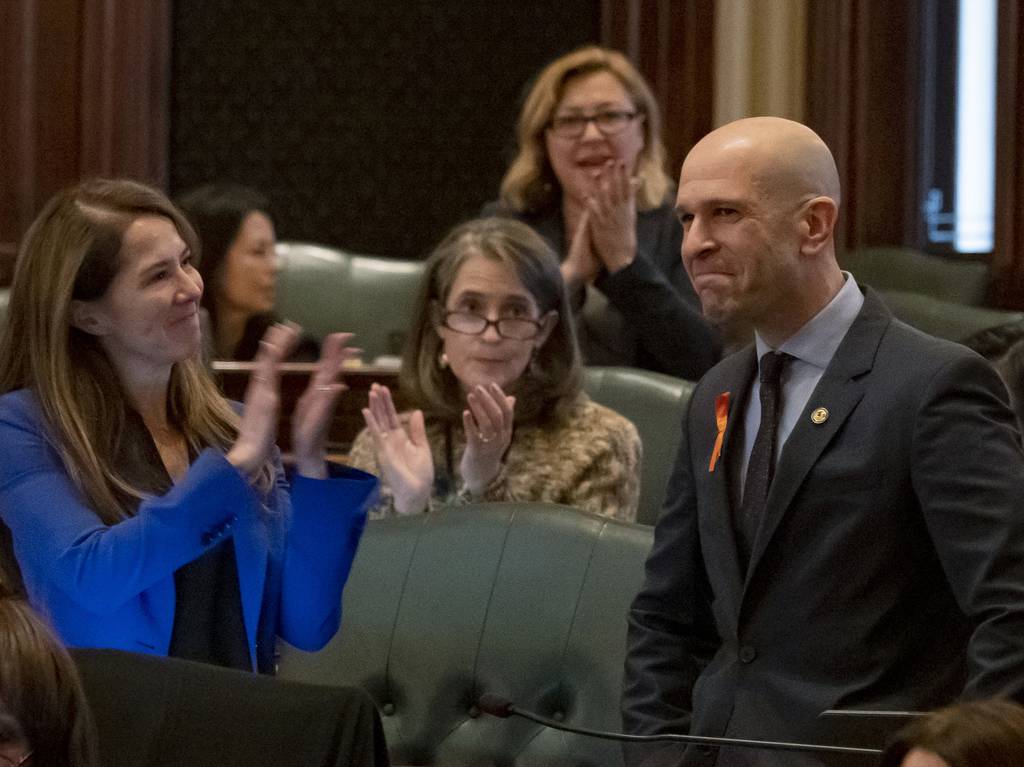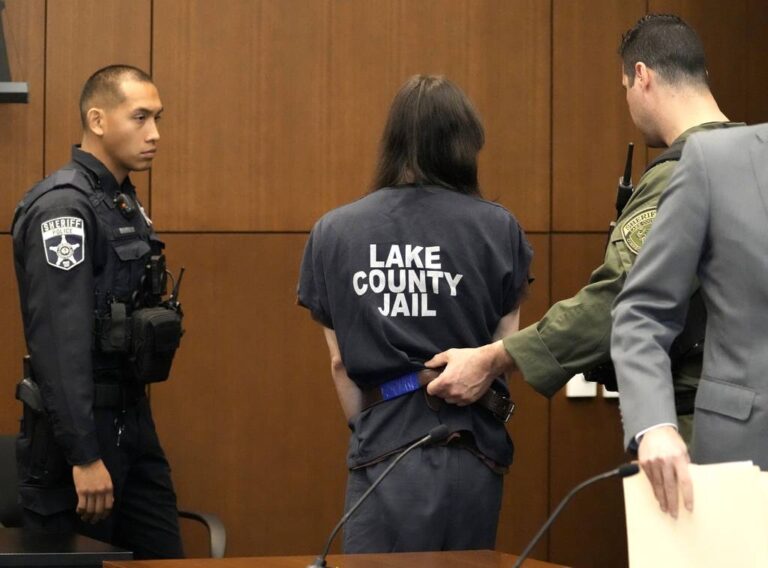In the immediate aftermath of last year’s mass shooting at Highland Park’s Fourth of July parade came the expected questions when such a tragedy unfolds: Who was the gunman? Where had his weapon come from?
And in Illinois, a state run by gun control-minded Democrats, could laws be bolstered and were police using them as effectively as possible?
Experts have suggested what was on the books — if properly understood and implemented — potentially could have prevented the alleged shooter from obtaining the high-powered semi-automatic rifle used to rain bullets down on paradegoers, killing seven and wounding dozens more.
Ensuing efforts centered on so-called red flag gun laws and other measures designed to take away firearms from those whose backgrounds suggest they should not have access to them. And a Tribune analysis of available state data shows that the push by politicians, advocates and police leaders to use them more often seems to have had an effect in the year since the mass shooting, including significant spikes in the use of the red flag laws and formal warnings to Illinois State Police about people who should not own firearms.
In a period running from approximately the date of the shooting through May 31, state police received more than 11,800 so-called clear and present danger reports, notifying them that someone might be too dangerous to be granted a gun license. That is more than double the number received during the same period the prior year, state data shows.
The use of a separate tool, the firearms restraining order, the form for the state’s red flag law, has also jumped since the Highland Park attack.
The orders, which judges can use to take guns away from people they consider a threat, were granted 228 times in the 3 ½ years from the law’s inception in January 2019 through early August 2022. Just from then until May, there have been another 146 granted, nearly tripling the rate of usage based on a monthly average.
Additionally, changes to the firearms restraining order law were incorporated this year in a sweeping measure from the Democratic-controlled state legislature — currently entangled in state and federal legal challenges — that bans more than 100 high-powered guns, including the type used in the shooting, and ammunition magazines with the capacity of holding more than 10 rounds in long guns and 15 in handguns.
Increases in the use of state law can be attributed to heightened awareness, Illinois State Police Director Brendan Kelly told the Tribune in a recent interview.
“The awareness is growing, and that is where the thrust of our effort has to be. It’s simply making people aware that they have this option,” Kelly said. “And then, as we do that, eliminating any barriers or challenges that may be there from a technical standpoint or a legal standpoint to simplifying the process.”
Still, gaps in the available data remain. There’s no data available from the courts that show the number of firearms restraining orders that are requested but denied by a judge, leaving an incomplete picture of whether more have been requested after Highland Park or if judges have been more likely to grant them.
At the same time, lawmakers still need to consider a series of recommendations from a state police-led panel assembled prior to the Highland Park shooting to find ways to further strengthen the law. Illinois also still lags behind other states in its use of firearms restraining orders despite the efforts by law enforcement officials, legislators and others.
“The events of Highland Park raised the firearms restraining order’s profile significantly across the state,” Kelly said, speaking for Illinois. “While it’s not clear that the red flag laws we have here would have definitely prevented that circumstance, it did catalyze and ignite a lot of conversation among law enforcement, mental health professionals, school administrators, and other stakeholders about why or why not these tools are being used on a daily basis.”
Although distinct, firearms restraining orders and clear and present danger reports have generally the same purpose. Firearm restraining orders, however, must be granted by a judge and can only be requested by law enforcement or certain people close to the subject in question. Clear and present danger reports can be filed by other individuals, including school administrators and mental health professionals, and can be used by state police in determining whether to revoke someone’s firearm owner’s identification card or deny a FOID card application.
State police changed the way the latter are handled in direct response to gaps exposed by the particulars of the case of Robert Crimo III, the alleged Highland Park gunman who awaits trial on murder charges.
His father, Robert Crimo Jr., also awaits trial on felony reckless conduct charges for helping his son acquire a FOID card more than two years before the shooting, despite reports to police that the son tried to kill himself and threatened to kill others, according to authorities.
The younger Crimo was able to obtain a FOID card just months after Highland Park police in September 2019 filed a clear and present danger report. That was because the report wasn’t retained after it was determined he didn’t have a firearm permit at the time or a pending application for one, state police have said.
After the July 4 shooting, the state police codified in its administrative rules the agency’s ability to retain clear and present danger reports even if the subject doesn’t have a FOID card or a pending application on file and isn’t deemed to be an imminent threat. The agency would be able to use such reports in evaluating future FOID card applications.
According to the state police, as a result of the rule changes, it retained 6,413 clear and present danger reports that previously could have had to be discarded out of a total of 11,812 reports filed from July 1, 2022 through May 31. Those 6,413 reports represented instances where the subject did not have a FOID card or pending application.
Those 11,812 reports also resulted in 5,181 FOID cards being revoked or applications being denied, more than double the 2,378 revocations and denials during the same period the previous year.
The Illinois Criminal Justice Information Authority, a state agency focused on research and analysis, told the Tribune they do not have data showing how many firearm restraining order petitions were filed overall. The Administrative Office of the Illinois Courts also does not have that information. Cook County Chief Judge Timothy Evans’ office approved the Tribune’s request to receive local FRO data, but that data was not made available before press time.
Kelly acknowledged the gap, saying even his agency can’t track the number of total firearm restraining order requests because it only learns of the orders once judges have signed off.
“If there’s a mechanism to be developed that would show that, I think that could reveal what are the fact patterns that result in a firearms restraining order being denied?” he said. “What does the court see that says, ‘Hey, this may not be enough or this does meet the burden of proof?’”
“It’s a relevant question,” added Kelly, due to the higher burden of proof for a firearms restraining order compared to a clear and present danger report.
Prosecutors do not directly request firearm restraining orders; that must be done by police, a relative or someone else close to the subject. But state law allows prosecutors to assist in filing petitions, and some state’s attorney’s offices in Illinois have integrated themselves into the process.
DuPage County has had 95 firearm restraining orders granted since the law took effect in 2019. That’s more than any other county in Illinois. Cook County had the second most petitions filed with 64, followed by Lake County with 49 and Kane County with 17, according to state police data.
Republican DuPage County State’s Attorney Robert Berlin credits the county’s high number of petitions to an aggressive push for training and awareness among prosecutors and police.
“We have direct contact with the police on these matters. And we want to make sure that they’re done correctly, Berlin said.
In Lake County, home to Highland Park, the prosecutors’ office has hosted training sessions for local law enforcement and other interested parties on firearms restraining orders in response to the July Fourth shooting. The most recent session, in late June, had more than 60 participants.

Eric Rinehart, the county’s Democratic top prosecutor, agreed the spike in firearms restraining orders since the shooting could probably be attributed to increased awareness. The tragedy sparked significant public conversations about red flag laws, as well as clear and present danger notifications.
“It’s important that we think about all of the different ways that we can regulate who has firearms,” Rinehart said. “I think we are all committed to developing a multilateral approach and collaborative approach with law enforcement, with schools and with health care providers, to make sure that we are finding, identifying and then isolating individuals who should not have firearms.”
Rinehart stressed that firearms restraining orders are only one way of taking guns from potentially dangerous people. Any judge presiding over a criminal case can order a defendant to turn over their weapons as a condition of being released on bond, for example.
Of the firearms restraining orders requested in Lake County, most have to do with the gun owner’s potential mental health issues, not a criminal case, Rinehart said. He also said his office is working to spread word about clear and present danger reports, recently sending a letter to local schools reminding administrators of their obligation to notify state police if they believe someone poses a threat.
Chicago’s endemic gun violence is largely carried out by those who do not own guns legally, limiting the reach of FROs. But law enforcement in Cook County told the Tribune that FROs are still in the mix.
A spokesperson for Democratic State’s Attorney Kim Foxx did not make anyone available for an interview. But in answers to written questions, the office stated that Cook County assistant state’s attorneys assigned to the office’s mental health and domestic violence units help people with emergency firearms restraining order petitions when the petitioner needs help.
As part of the gun and magazine ban, lawmakers extended the duration of when firearms restraining orders can go into effect from six months to up to one year, with a renewal option.
Ed Sullivan, a contract lobbyist for the Illinois State Rifle Association, which is one of several gun rights entities challenging Gov. J.B. Pritzker’s gun and magazine ban in court, said no one wants firearms to end up in the wrong hands. But he’s concerned the firearms restraining order law could have adverse effects on legal gun owners, particularly if they’re involved in messy court disputes with ex-spouses.
“We feel that the red flag law is unfortunately going in the wrong direction and can ultimately harm law-abiding citizens through false accusations, and we’ll be tracking that to see if indeed that pans out,” said Sullivan.

After the shooting, state Rep. Bob Morgan, a Deerfield Democrat who was with his family at the Highland Park parade when the first shots were fired, headed a working group of lawmakers focused on finding ways to reduce gun violence.
The result was the gun and magazine ban, which is currently awaiting rulings in separate legal challenges to the Illinois Supreme Court and 7th U.S. Circuit Court of Appeals over the law’s constitutionality.
Going forward, Morgan wants to review the process by which a gun owner accused in an order of protection for domestic violence would have to surrender their firearms.
Currently, such gun owners are generally required to turn in their guns to other FOID card holders in certain court proceedings if they’re named in such a petition. But this spring, the Illinois House passed a broad firearms safety bill that included a provision that would require them to only surrender their guns to law enforcement until the matter is resolved. The measure, however, hasn’t made it through the Senate.
Morgan emphasized efforts still need to be made to educate the public about the laws Illinois has in place.
“The vast majority of discussions around education and implementation of the firearms restraining orders are still relatively in their infancy,” Morgan said.







